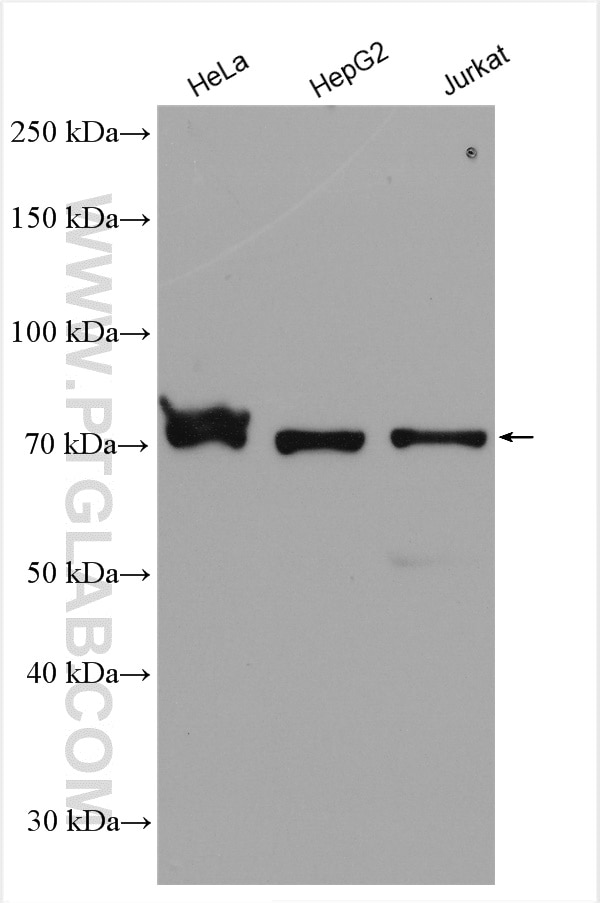Anticorps Polyclonal de lapin anti-CCNK
CCNK Polyclonal Antibody for WB, ELISA
Hôte / Isotype
Lapin / IgG
Réactivité testée
Humain
Applications
WB, ELISA
Conjugaison
Non conjugué
N° de cat : 26933-1-AP
Synonymes
Galerie de données de validation
Applications testées
| Résultats positifs en WB | cellules HeLa, cellules HepG2, cellules Jurkat |
Dilution recommandée
| Application | Dilution |
|---|---|
| Western Blot (WB) | WB : 1:500-1:2000 |
| It is recommended that this reagent should be titrated in each testing system to obtain optimal results. | |
| Sample-dependent, check data in validation data gallery | |
Informations sur le produit
26933-1-AP cible CCNK dans les applications de WB, ELISA et montre une réactivité avec des échantillons Humain
| Réactivité | Humain |
| Hôte / Isotype | Lapin / IgG |
| Clonalité | Polyclonal |
| Type | Anticorps |
| Immunogène | CCNK Protéine recombinante Ag25556 |
| Nom complet | cyclin K |
| Masse moléculaire calculée | 64 kDa |
| Poids moléculaire observé | 70 kDa |
| Numéro d’acquisition GenBank | BC015935 |
| Symbole du gène | CCNK |
| Identification du gène (NCBI) | 8812 |
| Conjugaison | Non conjugué |
| Forme | Liquide |
| Méthode de purification | Purification par affinité contre l'antigène |
| Tampon de stockage | PBS avec azoture de sodium à 0,02 % et glycérol à 50 % pH 7,3 |
| Conditions de stockage | Stocker à -20°C. Stable pendant un an après l'expédition. L'aliquotage n'est pas nécessaire pour le stockage à -20oC Les 20ul contiennent 0,1% de BSA. |
Informations générales
Cyclin-K (CCNK) is also named as CPR4 and belongs to the cyclin family. CCNK is a regulatory subunit of cyclin-dependent kinases that mediates activation of target kinases (PMID:10574912). It plays a role in transcriptional regulation via its role in regulating the phosphorylation of the C-terminal domain (CTD) of the large subunit of RNA polymerase II (POLR2A) (PMID:9632813). The Cyclin K/Cdk12 complex maintains genomic stability via regulation of expression of DNA damage response genes (PMID:22012619).
Protocole
| Product Specific Protocols | |
|---|---|
| WB protocol for CCNK antibody 26933-1-AP | Download protocol |
| Standard Protocols | |
|---|---|
| Click here to view our Standard Protocols |


